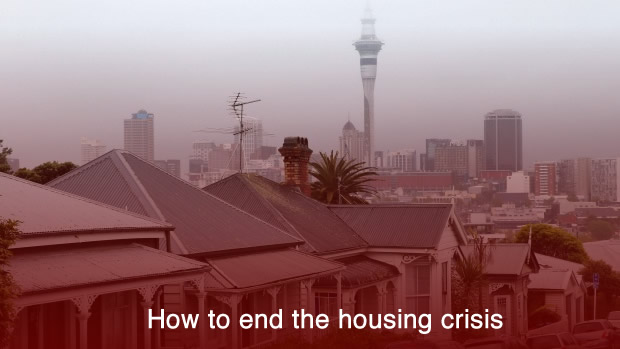We’re almost starting to feel sorry for the Reserve Bank. They are caught between a rock and a hard place, with inflation tamed but house prices out of control. They have tried out some tools – the loan to value ratio – and are talking about tightening this further for investors. But that will never be the complete solution, because of a lack of a comprehensive tax on housing. Yesterday the Deputy Governor Grant Spencer finally spoke up in his speech to the Rotorua Chamber of Commerce.
The speech
The crucial paragraph of the speech was this:
[quote]The tax treatment of housing is a major factor with potential to influence the demand/supply imbalance in the housing market. As reflected in our submission to the Productivity Commission’s inquiry on housing affordability, housing is the most tax-preferred form of investment, particularly when it is highly leveraged. Investors are often setting the marginal market prices that are then applied to the full housing stock within a regional market. Indicators point to an increasing presence of investors in the Auckland market and this trend is no doubt being reinforced by the expectation of high rates of return based on untaxed capital gains. While there are difficult issues and trade-offs to consider in this area, the Reserve Bank would like to see fresh consideration of possible policy measures to address the tax-preferred status of housing, especially investor related housing.[/quote]The media has reported this as a call for a Capital Gains Tax, because Spencer singled out capital gains as a carrot for investors. But Spencer was deliberately vague in his tax recommendations. As we have pointed out many times capital gains taxes have their problems. There are better ways to close the loopholes in the way we tax housing, land and businesses.
What needs to happen?
The problem is not primarily a lack of supply. We have set out what is needed to fix our housing woes in numerous blogs, such as this five point plan.
It is interesting that the RB is now advocating:
- taxing the capital return component of house ownership
- change in its prudential ratio requirements for at least some mortgages, and
- change in planning restrictions to enable high density housing in the middle of Auckland.
All 3 of these ideas have been advocated by us for a number of years now, as opposed to the Productivity Commission’s desire to see planning restrictions changed to facilitate extending Auckland’s suburbia over the Bombay Hills with existing ratepayers bearing that cost.
The Reserve Bank still needs to get tougher
But while this speech is a major step forward, the RB’s advocacy remains pretty half hearted. They need to clarify that there are other tax options than a Capital Gains Tax, particularly given all the loopholes that existed in the Greens and Labour Party proposals last election. Our proposed solution to the problem is a Comprehensive Capital Income Tax.
They also need to give the entire prudential management of mortgages a rethink. At the moment the approach is to pick off certain groups – they have previously slammed first home buyers and the current target is Auckland investors. They should keep it simple and acknowledge that housing is an increasingly risky asset class, so all prudential requirements need to shift accordingly.
The Reserve Bank argues owner occupiers might be less inclined to walk away when it all turns to mush leaving the bank with the mess. I wonder whether drawing that restriction is worth all the hassle with boundary problems that will arise from this rule. Here are some examples:
- Can people claim more than one house for their own use (e.g. baches)? If so how many? In a hot market you don’t need to bother with tenants so multiple house owners are common – no way should they get preferable mortgage terms.
- Could a husband own the family home and a wife own the rental? What about the kids owning their own homes too?
- How will this deal with complicated company and trust arrangements owning houses?
We are all investors
The fact is that we are all investors. We are a nation of tax dodgers, and housing is our favourite instrument. We just don’t like other people beating us at our own game, so we cry foul and lobby for rules to reign others in. The fact is that the rich will be able to leverage tax loopholes far more than the average family. So we should not fear closing loopholes, as ultimately the rich will end up paying far more than the average person.

